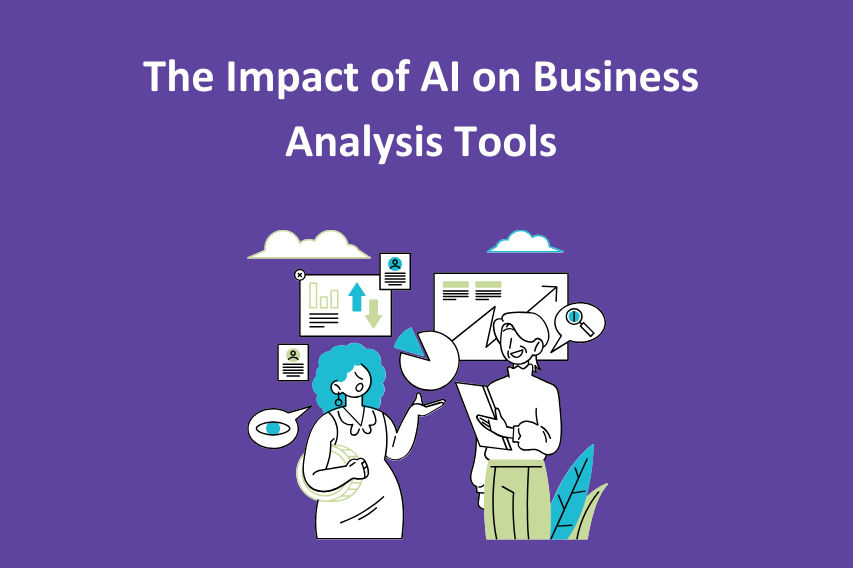To maintain a competitive edge, businesses must use the potential of data and technology. Tools for business analysis have become crucial for every business serious about making good judgements, improving internal operations, and expanding their business. The incorporation of AI is radically altering the functionality of Business Analysis Tools as the field develops.
This article will discuss how artificial intelligence (AI) has changed business analysis tools and how this development is influencing the future of Business Analysis Training.
Business Analysis Tools
Let’s get a handle on how important business analysis tools are in modern corporate settings before we get into the impact of AI.
Organizations may benefit greatly from the use of data collection, analysis, and interpretation capabilities provided by business analysis tools. They are crucial in running a firm, including formulating strategies, maximizing performance, and mitigating risks.
Business analysts rely on these tools to:
- Data Gathering: Collect and aggregate data from various sources, including internal databases, external APIs, and third-party platforms.
- Data Analysis: Analyze data to identify patterns, trends, and anomalies, enabling organisations to make data-driven decisions.
- Visualization: Present data in visually appealing formats such as charts, graphs, and dashboards, making it easier for stakeholders to understand complex information.
- Predictive Analytics: By analyzing past data and trends, you can predict future outcomes and make proactive decisions accordingly. This can help you stay ahead of the game and make informed choices.
- Process Optimization: Identify bottlenecks and inefficiencies in business processes, leading to improvements and cost savings.
Business Analysis Training
Organisations spend money on business analysis training to ensure their staff are making the most of available business analysis technologies.
In order to obtain the expertise necessary for their jobs, business analysts participate in extensive training program’s. Training in these areas equips analysts with the knowledge and skills necessary to conduct their jobs well.
Business analysts are trained to:
- Understand Business Objectives: Align analytical efforts with the organisation’s strategic goals and objectives.
- Gather Requirements: Elicit and document stakeholder requirements to ensure that solutions meet business needs.
- Analyse Data: Utilise statistical and analytical methods to derive meaningful insights from data.
- Communicate Findings: Present findings and recommendations to stakeholders clearly and concisely.
- Stay Current: Continuously update their skills to keep pace with evolving technologies and methodologies.

The Impact of AI on Business Analysis Tools
As AI technologies continue to advance, they are transforming the landscape of business analysis tools in several ways:
-
Automated Data Processing
AI-powered systems can automatically analyse and clean big datasets to save time and effort in data preparation. This frees analysts up to do things like data modelling and interpretation, which need a higher level of expertise.
-
Advanced Analytics
Advanced analytics like predictive modelling and machine learning are now possible with the use of AI algorithms in business analysis tools. This allows analysts to provide better forecasts and suggestions.
-
Natural Language Processing (NLP)
Analysts may get significant insights into consumer sentiment and feedback by using the NLP capabilities of AI systems to sift through unstructured text data like customer reviews and social media comments.

-
Automated Reporting
Tools that AI powers can produce automatic reports and dashboards, saving analysts time and ensuring that stakeholders have access to current information.
-
Personalization
Artificial intelligence has the ability to personalise the user experience inside business analysis tools by adapting suggestions and insights to the specific tastes and requirements of individual users.
-
Enhanced Decision Support
AI may give analysts real-time decision assistance by highlighting possible problems or abnormalities in the data. This enables analysts to respond and mitigate problems more quickly.
-
Improved Forecasting
Forecasting models that AI drives can analyse previous data in addition to external variables to produce more accurate forecasts of future trends. This enables organisations to plan ahead and adjust more effectively.
-
Reduced Bias
AI may assist in discovering biases in data analysis and lessen their effects, making it more likely that judgements will be based on accurate and objective information.
The Intersection of AI and Business Analysis Training
The integration of AI into business analysis tools has a direct impact on business analysis training programs. Here’s how:
- Updated Curriculum: Business analysis training programs must incorporate AI-related topics and tools into their curriculum to ensure that analysts are well-equipped to leverage AI capabilities in their work.
- New Skill Sets: Analysts need to acquire skills in AI-related areas such as machine learning, data science, and NLP to fully harness the potential of AI-powered business analysis tools.
- Continuous Learning: Business analysts must continuously update their skills to keep up with AI advancements.
- Cross-Disciplinary Training: Business analysis training programs should foster collaboration between business analysts and data scientists to effectively use AI tools for analysis.
- Ethical Considerations: Training programs should also emphasise the ethical use of AI in business analysis to address concerns related to bias, privacy, and transparency.
Conclusion
Business analysis tools are evolving as a result of the incorporation of artificial intelligence into them. The business analysts may now save time, improve forecast accuracy, and aid in decision-making with the use of AI-powered solutions. Business analysis courses must evolve to equip students with tools for optimizing artificial intelligence (AI) utilization in their work.
